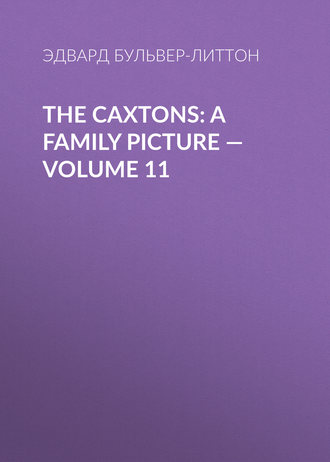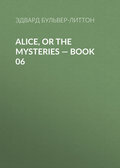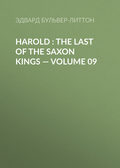
Эдвард Бульвер-Литтон
The Caxtons: A Family Picture — Volume 11
PART XI
CHAPTER I
The next day, on the outside of the "Cambridge Telegraph," there was one passenger who ought to have impressed his fellow-travellers with a very respectful idea of his lore in the dead languages; for not a single syllable, in a live one, did he vouchsafe to utter from the moment he ascended that "bad eminence" to the moment in which he regained his mother earth. "Sleep," says honest Sancho, "covers a man better than a cloak." I am ashamed of thee, honest Sancho, thou art a sad plagiarist; for Tibullus said pretty nearly the same thing before thee,—
"Te somnus fusco velavit amictu."1
But is not silence as good a cloak as sleep; does it not wrap a man round with as offusc and impervious a fold? Silence, what a world it covers,— what busy schemes, what bright hopes and dark fears, what ambition, or what despair! Do you ever see a man in any society sitting mute for hours, and not feel an uneasy curiosity to penetrate the wall he thus builds up between others and himself? Does he not interest you far more than the brilliant talker at your left, the airy wit at your right whose shafts fall in vain on the sullen barrier of the silent man! Silence, dark sister of Nox and Erebus, how, layer upon layer, shadow upon shadow, blackness upon blackness, thou stretchest thyself from hell to heaven, over thy two chosen haunts,—man's heart and the grave!
So, then, wrapped in my great-coat and my silence, I performed my journey; and on the evening of the second day I reached the old-fashioned brick house. How shrill on my ears sounded the bell! How strange and ominous to my impatience seemed the light gleaming across the windows of the hall! How my heart beat as I watched the face of the servant who opened the gate to my summons!
"All well?" cried I.
"All well, sir," answered the servant, cheerfully. "Mr. Squills, indeed, is with master, but I don't think there is anything the matter."
But now my mother appeared at the threshold, and I was in her arms.
"Sisty, Sisty! my dear, dear son—beggared, perhaps—and my fault—mine."
"Yours! Come into this room, out of hearing,—your fault?"
"Yes, yes! for if I had had no brother, or if I had not been led away,— if I had, as I ought, entreated poor Austin not to—"
"My dear, dearest mother, you accuse yourself for what, it seems, was my uncle's misfortune,—I am sure not even his fault! [I made a gulp there.] No, lay the fault on the right shoulders,—the defunct shoulders of that horrible progenitor, William Caxton the printer; for though I don't yet know the particulars of what has happened, I will lay a wager it is connected with that fatal invention of printing. Come, come! my father is well, is he not?"
"Yes, thank Heaven!"
"And I too, and Roland, and little Blanche! Why, then, you are right to thank Heaven, for your true treasures are untouched. But sit down and explain, pray."
"I cannot explain. I do not understand anything more than that he, my brother—mine!—has involved Austin in—in—" (a fresh burst of tears.)
I comforted, scolded, laughed, preached, and adjured in a breath; and then, drawing my another gently on, entered my father's study.
At the table was seated Mr. Squills, pen in hand, and a glass of his favorite punch by his side. My father was standing on the hearth, a shade more pale, but with a resolute expression on his countenance which was new to its indolent, thoughtful mildness. He lifted his eyes as the door opened, and then, putting his finger to his lips, as he glanced towards my mother, he said gayly, "No great harm done. Don't believe her! Women always exaggerate, and make realities of their own bugbears: it is the vice of their lively imaginations, as Wierus has clearly shown in accounting for the marks, moles, and hare-lips which they inflict upon their innocent infants before they are even born. My dear boy," added my father, as I here kissed him and smiled in his face, "I thank you for that smile! God bless you!" He wrung my hand and turned a little aside.
"It is a great comfort," renewed my father, after a short pause, "to know, when a misfortune happens, that it could not be helped. Squills has just discovered that I have no bump of cautiousness; so that, craniologically speaking, if I had escaped one imprudence, I should certainly have run my head against another."
"A man with your development is made to be taken in," said Mr. Squills, consolingly.
"Do you hear that, my own Kitty? And have you the heart to blame Jack any longer,—a poor creature cursed with a bump that would take in the Stock Exchange? And can any one resist his bump, Squills?"
"Impossible!" said the surgeon, authoritatively.
"Sooner or later it must involve him in its airy meshes,—eh, Squills?- entrap him into its fatal cerebral cell. There his fate waits him, like the ant-lion in its pit."
"Too true," quoth Squills. "What a phrenological lecturer you would have made!"
"Go then, my love," said my father, "and lay no blame but on this melancholy cavity of mine, where cautiousness—is not! Go, and let Sisty have some supper; for Squills says that he has a fine development of the mathematical organs, and we want his help. We are hard at work on figures, Pisistratus."
My mother looked broken-hearted, and, obeying submissively, stole to the door without a word. But as she reached the threshold she turned round and beckoned to me to follow her.
I whispered my father and went out. My mother was standing in the hall, and I saw by the lamp that she had dried her tears, and that her face, though very sad, was more composed.
"Sisty," she said, in a low voice which struggled to be firm, promise me that you will tell me all,—the worst, Sisty. They keep it from me, and that is my hardest punishment; for when I don't know all that he—that Austin suffers, it seems to me as if I had lost his heart. Oh, Sisty, my child, my child, don't fear me! I shall be happy whatever befalls us, if I once get back my privilege,—my privilege, Sisty, to comfort, to share! Do you understand me?"
"Yes indeed, my mother! And with your good sense and clear woman's wit, if you will but feel how much we want them, you will be the best counsellor we could have. So never fear; you and I will have no secrets."
My mother kissed me, and went away with a less heavy step.
As I re-entered, my father came across the room and embraced me.
"My son," he said in a faltering voice, "if your modest prospects in life are ruined—"
"Father, father, can you think of me at such a moment? Me! Is it possible to ruin the young and strong and healthy! Ruin me, with these thews and sinews; ruin me, with the education you have given me,—thews and sinews of the mind! Oh, no! there, Fortune is harmless! And you forget, sir,—the saffron bag!"
Squills leaped up, and wiping his eyes with one hand, gave me a sounding slap on the shoulder with the other.
"I am proud of the care I took of your infancy, Master Caxton. That comes of strengthening the digestive organs in early childhood. Such sentiments are a proof of magnificent ganglions in a perfect state of order. When a man's tongue is as smooth as I am sure yours is, he slips through misfortune like an eel."
I laughed outright, my father smiled faintly; and, seating myself, I drew towards me a paper filled with Squills's memoranda, and said, "Now to find the unknown quantity. What on earth is this? 'Supposed value of books, L750.' Oh, father! this is impossible. I was prepared for anything but that. Your books,—they are your life!"
"Nay," said my father; "after all, they are the offending party in this case, and so ought to be the principal victims. Besides, I believe I know most of them by heart. But, in truth, we are only entering all our effects, to be sure [added my father, proudly], that, come what may, we are not dishonored."
"Humor him," whispered Squills; "we will save the books." Then he added aloud, as he laid finger and thumb on my pulse, "One, two, three, about seventy,—capital pulse, soft and full; he can bear the whole: let us administer it."
My father nodded: "Certainly. But, Pisistratus, we must manage your dear mother. Why she should think of blaming herself because poor Jack took wrong ways to enrich us, I cannot understand. But as I have had occasion before to remark, Sphinx is a noun feminine."
My poor father! that was a vain struggle for thy wonted innocent humor.
The lips quivered.
Then the story came out. It seems that when it was resolved to undertake the publication of the "Literary Times," a certain number of shareholders had been got together by the indefatigable energies of Uncle Jack; and in the deed of association and partnership, my father's name figured conspicuously as the holder of a fourth of this joint property. If in this my father had committed some imprudence, he had at least done nothing that, according to the ordinary calculations of a secluded student, could become ruinous. But just at the time when we were in the hurry of leaving town, Jack had represented to my father that it might be necessary to alter a little the plan of the paper, and in order to allure a larger circle of readers, touch somewhat on the more vulgar news and Interests of the day. A change of plan might involve a change of title; and he suggested to my father the expediency of leaving the smooth hands of Mr. Tibbets altogether unfettered, as to the technical name and precise form of the publication. To this my father had unwittingly assented, on hearing that the other shareholders would do the same. Mr. Peck, a printer of considerable opulence and highly respectable name, had been found to advance the sum necessary for the publication of the earlier numbers, upon the guarantee of the said act of partnership and the additional security of my father's signature to a document authorizing Mr. Tibbets to make any change in the form or title of the periodical that might be judged advisable, concurrent with the consent of the other shareholders.
Now, it seems that Mr. Peck had, in his previous conferences with Mr. Tibbets, thrown much cold water on the idea of the "Literary Times," and had suggested something that should "catch the moneyed public,"—the fact being, as was afterwards discovered, that the printer, whose spirit of enterprise was congenial to Uncle Jack's, had shares in three or four speculations to which he was naturally glad of an opportunity to invite the attention of the public. In a word, no sooner was my poor father's back turned than the "Literary Times" was dropped incontinently, and Mr. Peck and Mr. Tibbets began to concentrate their luminous notions into that brilliant and comet-like apparition which ultimately blazed forth under the title of "The Capitalist."
From this change of enterprise the more prudent and responsible of the original shareholders had altogether withdrawn. A majority, indeed, were left; but the greater part of those were shareholders of that kind most amenable to the influences of Uncle Jack, and willing to be shareholders in anything, since as yet they were possessors of nothing.
Assured of my father's responsibility, the adventurous Peck put plenty of spirit into the first launch of "The Capitalist." All the walls were placarded with its announcements; circular advertisements ran from one end of the kingdom to the other. Agents were engaged, correspondents levied en masse. The invasion of Xerxes on the Greeks was not more munificently provided for than that of "The Capitalist" upon the credulity and avarice of mankind.
But as Providence bestows upon fishes the instrument of fins, whereby they balance and direct their movements, however rapid and erratic, through the pathless deeps, so to the cold-blooded creatures of our own species—that may be classed under the genus Money-Makers—the same protective power accords the fin-like properties of prudence and caution, wherewith your true money-getter buoys and guides himself majestically through the great seas of speculation. In short, the fishes the net was cast for were all scared from the surface at the first splash. They came round and smelt at the mesh with their sharp bottle-noses, and then, plying those invaluable fins, made off as fast as they could, plunging into the mud, hiding themselves under rocks and coral banks. Metaphor apart, the capitalists buttoned up their pockets, and would have nothing to say to their namesake.







